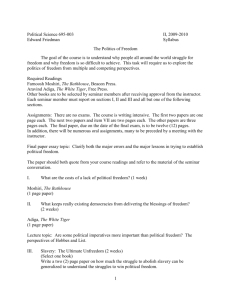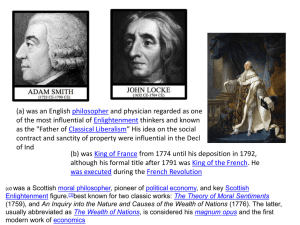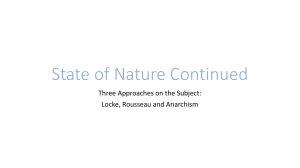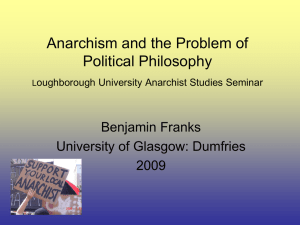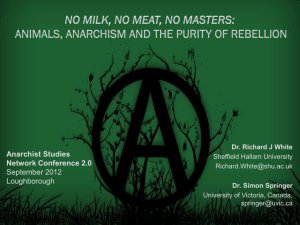Intro Part 4 Power Point
advertisement
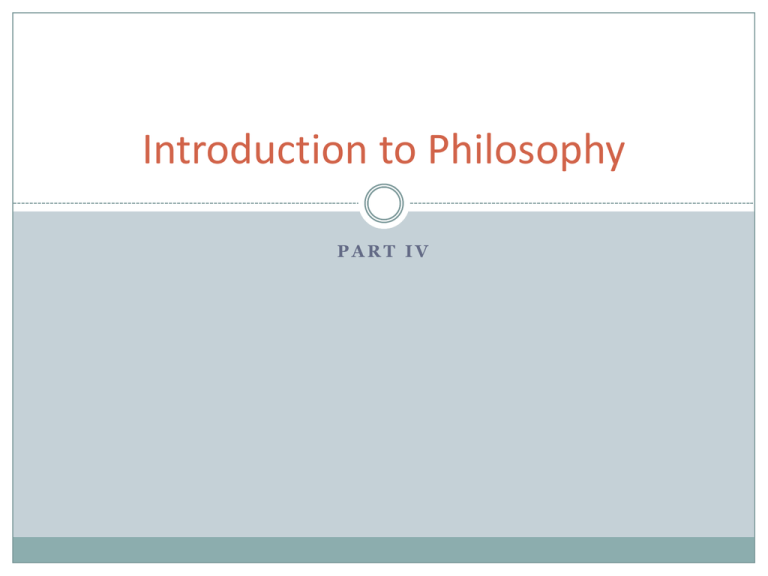
Introduction to Philosophy PART IV Introduction to Ethics What is Ethics Morality & Ethics Moral Philosophy/Ethics Some Classic Moral Problems Some Moral Questions Ethical Assessment & Value Focus of Ethical Assessment Value Introduction to Ethics Spectrum of Morality Introduction Absolutism Objectivism Relativism Subjectivism Moral Nihilism Moral Skepticism Introduction to Ethics IV Ethics & Other Normative Areas Introduction Ethics Religion Law/Rules Etiquette Aesthetics Distinct Introduction to Ethics Moral Theories Aretaic/Virtue Theory Cognitivism Cultural Relativism Divine Command Theory Deontology Ethical Egoism Ethical Relativism Emotivism Error Theory Hedonism Introduction to Ethics Intuitionism Moral Anti-Realism & Realism Moral Skepticism Natural Law Naturalism Prescriptivism Subjectivism Teleology Utilitarianism Introduction Defined Utility Relevant Beings Act & Rule Utilitarianism Proponents Appeal Costs & Benefits Democracy Moral Intuitions John stuart mill Background Background Education Life Works Utilitarianism What Utilitarianism Is Foundation of Morals Ends The Pig Objection The Objection Mill’s Reply Difference in quality of pleasures Basis of the difference in quality of pleasures Preference Higher Faculties Happiness & Contentment Objection Competent Judges Utilitarianism Standard, End & Scope Standard End & Scope Proof of the Principle of Utility Questions of Ultimate Ends The Analogy All Possible Proof John Stuart Mill Objection People desire things other than happiness Virtue & Happiness Love of Money Love of Power & Fame Virtue contrasted with love of money, power or fame Happiness Proof of the Principle of Utlity John Stewart Mill Internal Problems Formulation Consequences Response External Problems Unreasonable Expectations The Rights of Minorities Nothing is Forbidden Absurd Implications Integrity Deontology 13 Introduction Defined Rule-Deontological Theories Defined Rules Proponents Appeal Kantian Ethics 14 Introduction Theoretical Reason Practical Reason Ethical Works Emphasis Rationalism Categorical imperative 15 The Good Will The Good Will & Qualities Worthiness of Happiness Virtues The Goodness of the Good Will Moral Worth, Maxim & Universal Law Moral Worth The Good Law Example Determining the Good Duty Categorical imperative 16 The Categorical Imperative Law & Will Imperatives Examples Suicide Lying Promises Rusting Talents Helping Others Categorical Imperative 17 Ends Rational Beings Objects of the Inclination Rational Beings Supreme Practical Principle Kingdom of Ends Rational Beings as Legislators Three Postulates of Morality Introduction Freedom Immortality God Problems 18 Problems Duty Inflexibility Rationality Terrible Maxims seem to pass the test Kingdom of Ends Aesthetics 19 Aesthetics Defined Problems Questions Aestheticians, Critics & Artists Oscar Wilde 20 Background (1864-1900) Life Poetry Plays Prose New Aesthetics 21 First Part Vivian Position Mirror Cyril’s Challenge to Vivian Nature & life imitate art Vivian’s Case Nature & Art Change in London’s climate is due to a school of art. Nature is our creation New Aesthetics 22 Looking & Seeing Things are because we see them. The influence of the arts. Looking is different from seeing. One does not see anything until one sees its beauty Example: fog Nature’s Imitation of Art Effects Nature Sunset Life Art New Aesthetics 23 What Art Expresses Cyril Imitative instinct Art expresses Temper of its age Spirit of its time Moral & social conditions Vivian Art never expresses anything but itself Vanity Crowd Not so Art is not symbolic of any age Ages are the symbols of art. New Aesthetics 24 Imitative Art Vivian The more imitative art is, the less it represents the spirit of the age. Example The more abstract & ideal, the more it represents the spirit of the age. Architecture or music Cyril The spirit of the age. Arts of imitation reveal the spirit of the age. Vivian: Middle Ages Imitative arts Middle Ages No great artist ever sees things as they really are. New Aesthetics 25 Vivian: Japan Japanese people as presented in art do not exist. No resemblance. Nothing extraordinary Japan is a pure invention. Painter See a Japanese effect At home Vivian: Ancient Greeks Greek art Athenian women Art has never told us the truth New Aesthetics 26 Vivian: Doctrines of the New Aesthetics First Doctrine: Art never expresses anything but itself Independent Age Opposes History Does not reproduce its age To pass from the art of a time to the time itself is the great mistake all historians make. Second Doctrine: All bad art comes from returning to Life and Nature and elevating them into ideals. Life & nature Realism is a complete failure Avoid modernity The only beautiful things Hecuba Modern Romanticism New Aesthetics 27 Third Doctrine: Life Imitates Art for more than Art imitates life. Fourth Doctrine: Lying, the telling of beautiful untrue things, is the proper aim of art. Political Philosophy 28 Introduction Social & Political Philosophy Classic problems in social philosophy Some questions in social philosophy Liberty Introduction Questions Liberty Positive & Negative Liberty Who/What Determines Liberty? Liberty & Security Other Grounds for Limiting Liberty Benito Mussolini Background Life Fascism Fascism Peace Only War Life Fascism & Other Views Marxism & Fascism Fascism Denies Democracy & Fascism Predictions Fascism Foundation of Fascism Fascism The Fascist State Empire Liberty Goal & History of Liberty Mill’s Goal Liberty & Rulers Liberty as Limiting Power History of Limiting Power of Rulers The Tyranny of the People The Will of the People The Tyranny of the Majority Liberty Limits. Rules & Principles The Limit of Legitimate Interference The Basis of Rules No Principle Mill’s Principle Rightful Exercise of Power Limits in Application: Children & Those in Need of Care Limit in Application: Barbarians Liberty Utility as the Foundation of Liberty Utility Punishment Compelling Accountability Sphere of Action & Regions of Liberty Sphere of Action 1st Region of Liberty: Inward Domain of consciousness 2nd Region of Liberty: Tastes & Pursuits 3rd Region of Liberty: Liberty of Combination Liberty Opposition Opposes Ancient Commonwealths Modern Commonwealths Tendencies Against Liberty Emma Goldman Background (1869-1940) Life Activities Works Anarchism Anarchism’s Opposition Objections to anarchism Impractical Stands for violence & destruction Reply to the First Objection Oscar Wilde Existing conditions True criterion Anarchism is more practical Reply to Second Objection The most violent element in society is ignorance. Anarchism only destroys parasitic growths. Anarchism Anarchism Nature of Anarchism Anarchism New social order All governments rest on violence. Two elements: Individual & Social Instinct Not foreign Battled Anarchism Only philosophy Anarchism Anarchism Pernicious Influences-Religion Liberator Anarchism liberates War on pernicious influences Strongholds of Enslavement Religion Property Government Religion Dominates man’s mind Kingdom Anarchism Rid of dominion Anarchism Pernicious Influences-Property Property Dominion of man’s needs Anarchism Property is Robbery Proudhon Monopolizing Productivity exceeds demand Demand Real Wealth Utility Gray & Hideous Things Anarchism Rid of dominion Anarchism Machine & Centralization Machine subservience Anarchism Anarchism & Property Anarchism Oscar Wilde Perfect Personality Anarchism’s Ideal Economic Arrangements Anarchism Pernicious Influences: The State The Three Government Religion Property State Emerson Absolute subordination Thoreau Injustice Greatest offense Ouida on the State Demands obeyed & treasury filled Clockwork Destroys State requires Anarchism Bakunin on the State The state State as protector of property & monopoly. Law & Order Fatal Belief that the state Rests on natural laws Maintains social order & harmony Diminishes crime Prevents the lazy from fleecing his fellows Natural Law Natural law Machinery of government Obey Violence Blackstone Anarchism Order Diminishing Crime Order Terror Social harmony Society Authority responds Arsenal of government Absurd apology State is greatest criminal Failed to destroy Crime is misdirected energy Wrong channels Laziness Free Laziness Present system Anarchism Anarchism Strip labor Making work Government must be done away with Destroying government & laws Only in freedom Human Nature Horrible crimes The greater the charlatan Cannot speak of human nature John Burroughs: experimental animals Freedom Anarchism Anarchism stands for Liberation of the mind Liberation of the human body Liberation from the shackles of government Social order Order Methods Political Machinery Anarchism opposes the use of political machinery Thoreau on voting History Laws Anarchism Representatives Representatives Corruption Direct Action Stirner Anarchism Defiance Illegal Free Anarchism More on direct action Universal suffrage American independence John Brown Trade unions Direct action
